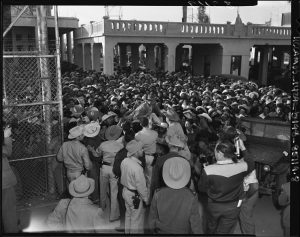Summary
Labor shortages during World War II led the U.S. government to negotiate with the Mexican government to recruit Mexican workers, all male and without their families, to work on short-term contracts in U.S. agriculture and in other war industries. After the war, Mexican workers were restricted to agriculture, as U.S. and Mexican authorities renegotiated the terms of the program several times. Mexicans participated in the belief that becoming braceros temporarily would enable them to acquire additional skills and knowledge while earning higher wages than available in Mexico. In practice, many became trapped in cycles of working abroad for higher wages in harsh manual labor agricultural jobs in the United States. The bracero program’s costs, employers’ abuse, and officials’ corrupt practices led many Mexicans to seek work in the United States illegally outside of its auspices, and readily found employment with U.S. agricultural conglomerates and other employers seeking workers for lower wages. The bracero program persisted until 1964, despite its many problems, when labor and civil rights reformers successfully pressured for its termination.

Source
August 4, 1942
For the temporary migration of Mexican agricultural workers to the United States. As revised April 26, 1943, by an exchange of notes between the American embassy at Mexico City and the Mexican Ministry for Foreign Affairs.
General Provisions
1) It is understood that Mexicans contracting to work in the United States shall not be engaged in any military service.
2) Mexicans entering the United States as result of this understanding shall not suffer discriminatory acts of any kind in accordance with the Executive Order No. 8802 issued at the White House June 25, 1941.
3) Mexicans entering the United States under this understanding shall enjoy the guarantees of transportation, living expenses and repatriation established in Article 29 of the Mexican Federal Labor Law as follows . . . .
4) Mexicans entering the United States under this understanding shall not be employed to displace other workers, or for the purpose of reducing rates of pay previously established . . . .
1. a) Contracts will be made between the employer and the worker under the supervision of the Mexican Government. (Contracts must be written in Spanish.)
1. b) The employer shall enter into a contract with the sub- employer, with a view to proper observance of the principles embodied in this understanding.
Admission
1. The Mexican health authorities will, at the place whence the worker comes, see that he meets the necessary physical conditions . . .
The master contracts for workers submitted to the Mexican government shall contain definite provisions for computation of subsistence and payments under the understanding.
1. The term of the contract shall be made in accordance with the authorities of the respective countries.
2. At the expiration of the contract under this understanding, and if the same is not renewed, the authorities of the United States shall consider illegal, from an immigration point of view, the continued stay of the worker in the territory of the United States, exception made of cases of physical impossibility.
Savings Fund
The respective agencies of the Government of the United States shall be responsible for the safekeeping of the sums contributed by the Mexican workers toward the formation of their Rural Savings Fund . . . .
Numbers
As it is impossible to determine at this time the number of workers who may be needed in the United States for agricultural labor employment, the employer shall advise the Mexican Government from time to time as to the number needed. The Government of Mexico shall determine in each case the number of workers who may leave the country without detriment to its national economy.

